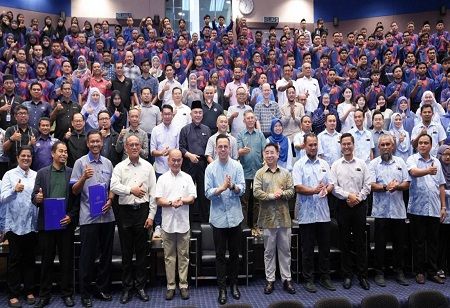- Malaysia's Human Resources Ministry and Huawei Malaysia launch smart classrooms in six ADTEC campuses to modernize TVET through hybrid learning tools.
- Pilot integrates Huawei IdeaHub smartboards and LMS, with 41 trainers professionally upskilled to deliver digital-first technical education.
- Initiative supports Malaysia MADANI goals, tackling automation risks by strengthening digital skills and enhancing workforce readiness.
As part of an effort to modernize technical and vocational education and training (TVET), Malaysia's Ministry of Human Resources (KESUMA) partnered with Huawei Malaysia to implement smart classroom and digital classroom systems in six campuses of the Advanced Technology Training Centre (ADTEC). The proof-of-concept (PoC) pilot will operate through December 2025 and involves ADTEC Senai, the national reference centre.
The digital classroom and smart classroom are based on a hybrid model of learning that combines a Learning Management System (LMS) with Huawei IdeaHub smartboards. These smartboards support real-time lessons, recording of lessons, and sharing of content across campuses.
All 41 trainers have received professional training from Huawei Malaysia for the successful implementation of new teaching systems. The PoC campuses are also available to be visited by other ministries, agencies and institutions with a view to encourage cross-institutional sharing of knowledge.
Commenting on the launch, Minister of Human Resources Steven Sim said the programme lends support to national efforts to enhance the digital workforce and is central to ensuring TVETs remain relevant.
This partnership is the next move of the continued KESUMA-Huawei collaboration, initiated under an MoU signed during the Malaysia-China Summit in December 2024. The accord involves capacity building and infrastructure, training technologies in new fields like 5G and cloud computing.
Huawei has been active in the TVET sector already through its current collaboration with the JTM. Its learning center within ADTEC Kuala Lumpur has trained more than 700 professionals with an aim of achieving 2,000 participants by year end.
KESUMA recognized that the efforts are at a crucial juncture. A TalentCorp survey indicated that 620,000 Malaysian jobs are vulnerable to being replaced by automation. Empowering the workforce with digital skills is no longer a choice but it is essential.
The ministry further stated that this effort is a demonstration of the Malaysia MADANI values of wellness and sustainability, creativity, and is a significant move in mapping a future of inclusivity and competitiveness for TVET.

